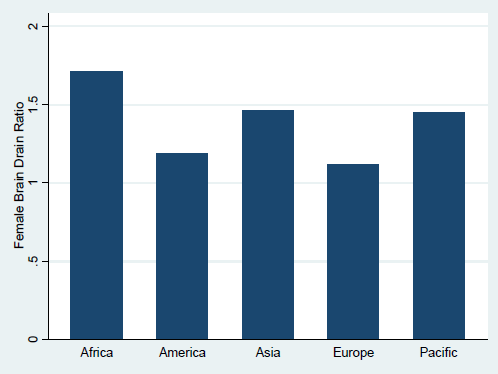The African society has acknowledged the success of very few women in her history. Many tribes in Pre-colonial Africa gave women little or no opportunities’ to actively participate in major arms of their respective communities’. They were openly believed to be inferior to men hence, the patriarchal and patrilineal nature of most African families and societies.
Although the 21st century is witnessing a difference in how women are perceived as new gender equality movements attempt to reshape our traditional worldviews, a majority of the women in Africa still sit under the stereotyped weakness and other forms of subservience. One can easily argue that Africa is still largely “male dominated” in her affairs, either by deliberate design or a consequence of passive acts of subordination.
The problems experienced in a male dominated Africa are probably too numerous to mention but a few will be highlighted below. These issues will cut across all facets of societal life.
- Economic Development in Sub-Saharan Africa is Engendered
According to the United Nations Development Programme (UNDP), Gender inequality is costing sub-Saharan Africa on average $US95 billion a year, peaking at US$105 billion in 2014– or six percent of the region’s GDP – jeopardizing the continent’s efforts for inclusive human development and economic growth, according to the Africa Human Development Report 2016: Advancing Gender Equality and Women’s Empowerment in Africa. Deeply-rooted structural obstacles such as unequal distribution of resources, power and wealth, combined with social institutions and norms that sustain inequality are holding African women, and the rest of the continent, back. The report estimates that a 1 percent increase in gender inequality reduces a country’s human development index by 0.75 percent.
While the continent is rapidly closing the gender gap in primary education enrolment, African women achieve only 87 percent of the human development outcomes of men, driven mainly by lower levels of female secondary attainment, lower female labor force participation and high maternal mortality.
African women make 70 cents for each dollar made by men. Only between 7 and 30 percent of all private firms have a female manager.
UNDP Africa Director Abdoulaye Mar Dieye. “Closing the gender gap would not only set Africa on a double-digit economic growth track, but would also significantly contribute to meeting its development goals.”
- Un-optimized economic structures
According to the UN WOMEN reports, Women’s economic equality is good for business. Companies greatly benefit from increasing leadership opportunities for women, which is shown to increase organizational effectiveness. It is estimated that companies with three or more women in senior management functions score higher in all dimensions of organizational effectiveness. Much of the African economy is bereft of the expertise as well as meaningful contribution of women because of the stereotype attached to women in top executive positions.
They are believed to be home makers and lack training for committing themselves to work instead of home and family. Contrary to this view, it has been revealed that most African women who find themselves in top positions usually strike a balance between home and work. Often times, they stay married while in their top positions.
Also, the unpaid jobs performed by the average African woman amount to three times their male counterparts. More women work in low paying vulnerable jobs than men for instance, in Sub-Saharan Africa, statistics shows ratio of women to men as nearly 85.5 per cent versus 70.5 per cent. All these indices leads to the ineffective optimization of the economic structure.
- Brain Drain & High Loss of Female Human Capital
Africa has lost a significant number of intellectuals due to the gender gap in societies. Often times, these much needed intellectuals travel outside the shores of the continent because their abilities and potentials were stifled by societal expectations. Roles usually assigned to them are perceived to be less strenuous and feminine so they dont compete with their male counterparts.
Domination of men in Africa has led to a systematic brain drain where females are taught to leave the job of thinking, invention and innovation to men. In a study (Institutionalized Inequality and Brain Drain: An Empirical Study of the Effects of Women’s Rights on the Gender Gap in High-Skilled Migration) it was discovered that high-skilled women are more likely to migrate than men in almost all continents but the gender gap in brain drain rates is the highest in the case of African countries while there is almost no gender gap in the brain drain rate of people migrating from Europe.

Female high-skilled migration rates relative to that of men (the female brain drain ratio) across
origin countries’ continents, year 2000, and data from Docquier, et al. (2009)
If gender inequality is also associated with the flight of female human capital, this could another economically important channel through which gender inequality harms development.
Furthermore, if female brain drain reinforces gender inequality, then this may suggest that female brain drain is more nefarious than brain drain generally
- Land rights & Power relations between men and women in Africa
According to UNDP, Experts report that women in Africa contribute 70 per cent of food production and account for nearly half of all farm labour, and 80–90 per cent of food processing, YET, women often lack rights to land and own only approximately 15% of land rights
Today, it is not uncommon for teenage girls to be married, widow inheritance by force and with other ‘property ‘ along. Wife-beating is a very part of our modern life. Many girls in these areas had to drop out of school, because priority is given to boys. One can’t overestimate the impact of this allowed injustice
- It creates a cycle of de-motivation
A woman is known to have the most influence in the lives of her children as she spends more time in their upbringing. Male dominated Africa has created a culture of women whose life aspiration is marriage and child rearing. This same orientation is passed on to subsequent generations and the cycle of unmotivated women continues.
The benefits of incorporating women in the African society far outweigh the cost as Africa stands to gain more. It is in this vein that many people have sprung up to challenge the status quo and call for a repositioning of women.
References
Sources:
– unwomen. – UNDP – Institutionalized Inequality and Brain Drain – ukessays

